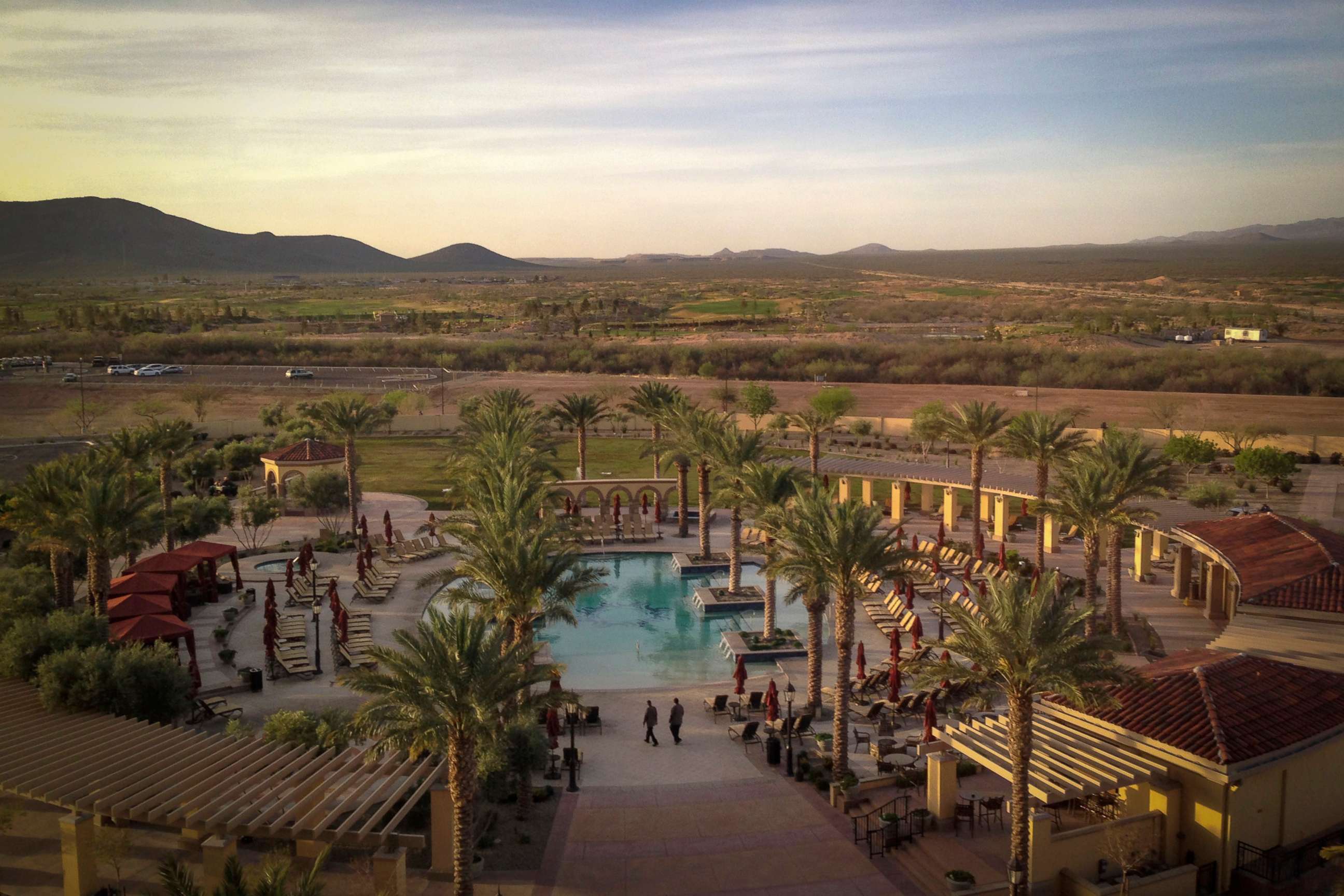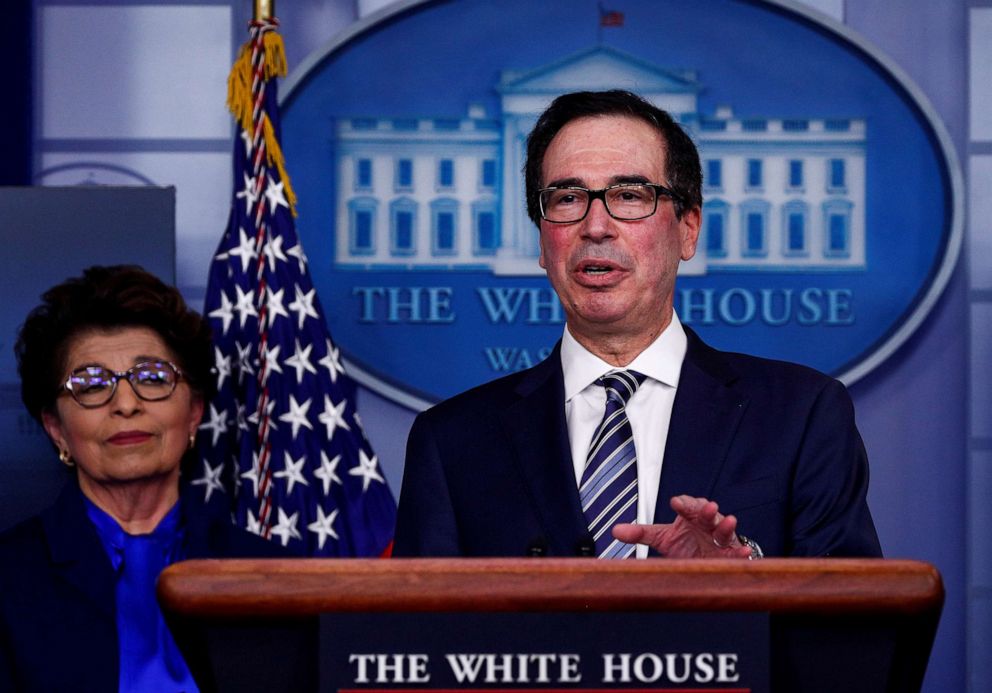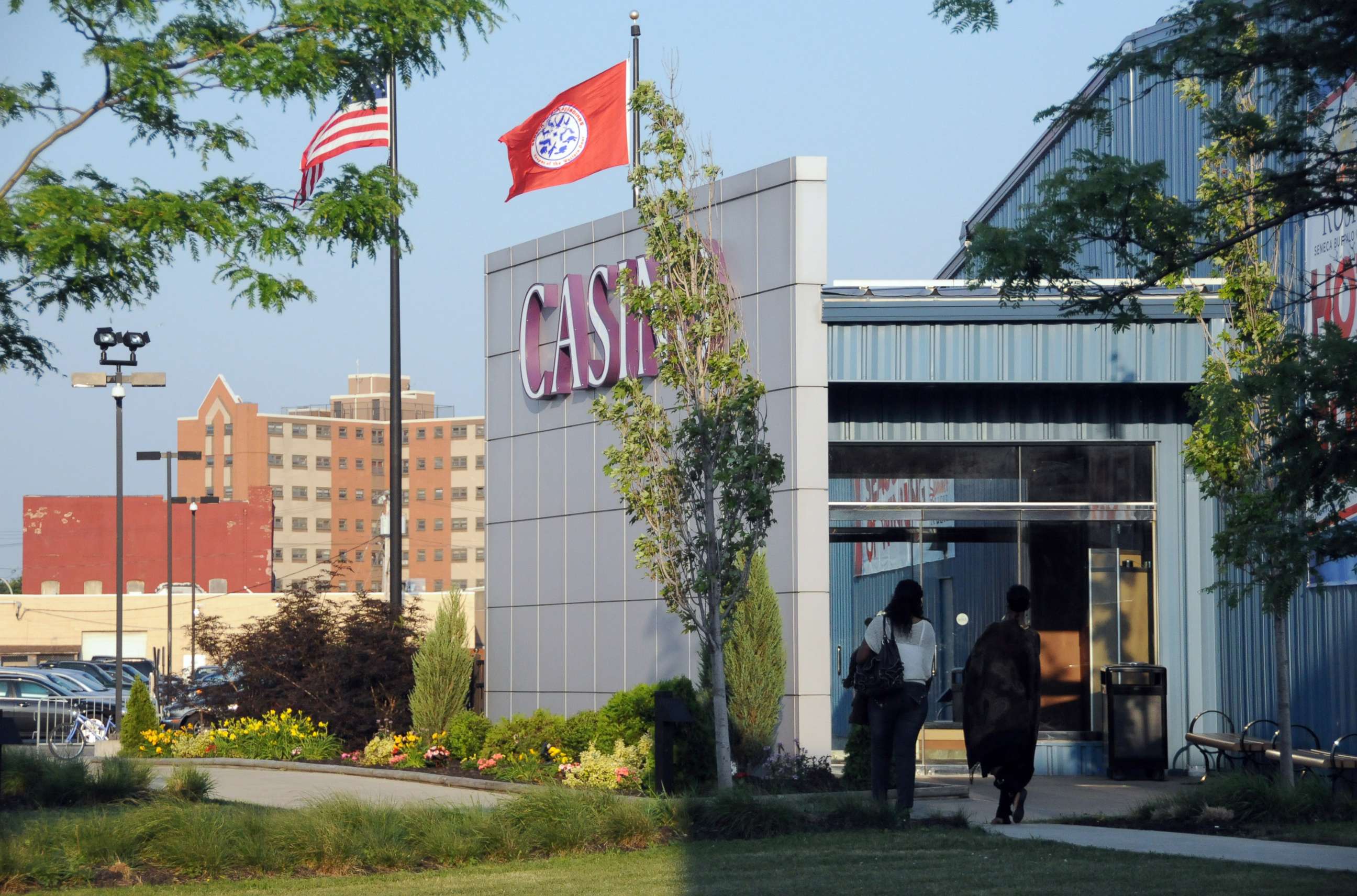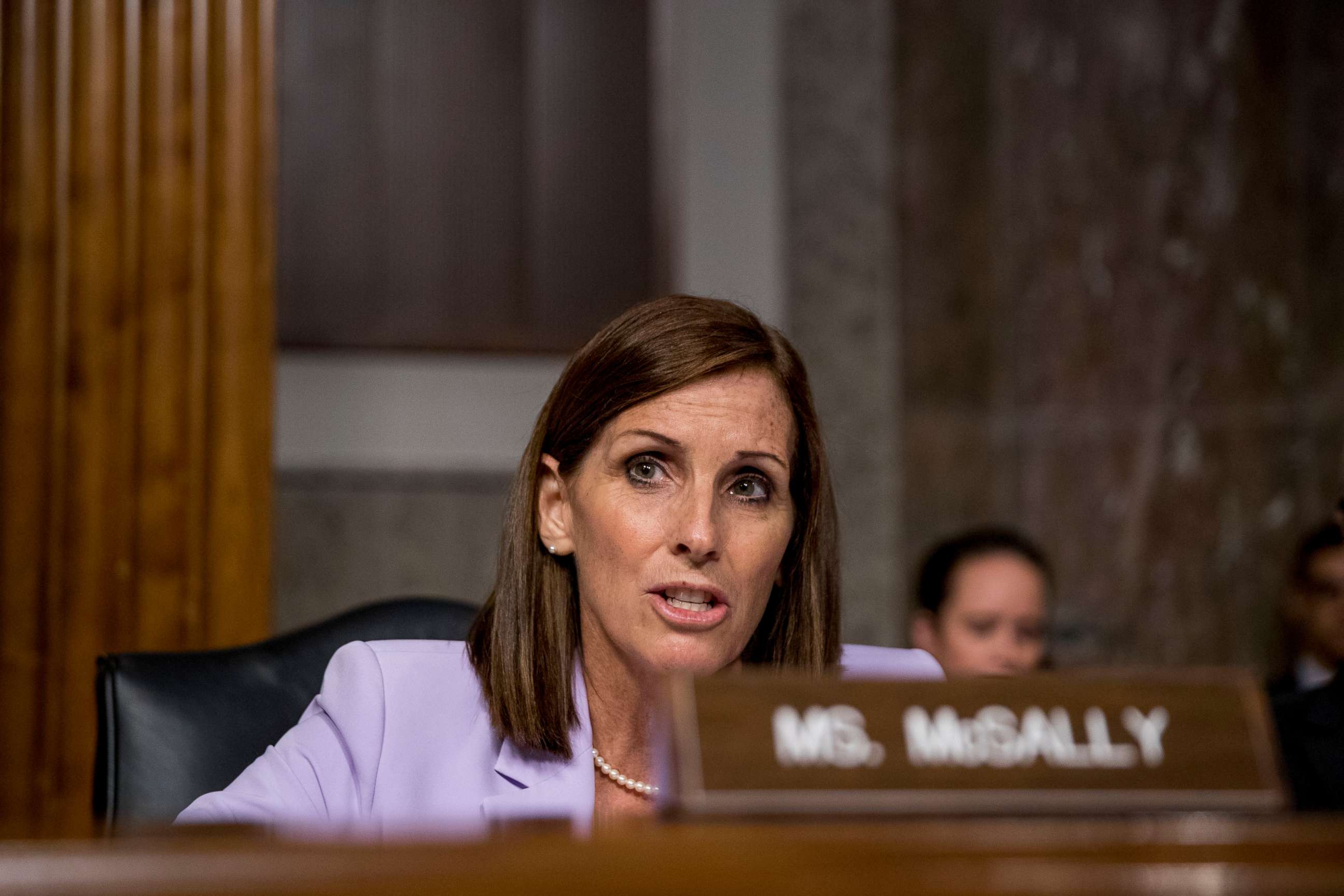For tribes, casinos fund what the government doesn't. Now, they're closed.
"We're not business casinos, we're community casinos."
When Muscogee Creek Nation, the nation's fourth-largest tribe, closed its casinos six weeks ago, that suddenly halted a revenue stream that provided school clothes for children, support for the elderly and health care for thousands.
"We're losing about $5 million a month. It's a tremendous hit," said Jason Salsman, a member of the Muscogee Creek Nation and the tribe's communications director.
Nearly 1,000 casinos across the country have closed since coronavirus hit the U.S., according to the American Gaming Association. More than half of those are on Native American land, where the facilities supplement chronically underfunded health and education programs.
Now, many tribes are cutting into their own reserves to keep casinos, often their economic lifeblood, above water, while also keeping thousands employed and with health care.
Initially, payroll deficits suffered by tribal casinos were expected to be repaid by the federal government's Paycheck Protection Program, a loan for small businesses to help cover payroll and utilities that could be forgiven after eight weeks. But, unexpectedly, Indian gaming operations were left out of the first round of PPP.
Tribal leaders described it as a "doubly whammy" and a "massive hit."

"We're not business casinos, we're community casinos," Salsman told ABC News. "Although I feel bad for the industry, when a casino goes down in Las Vegas, it's different. Tribal casinos are taking those casino revenues and putting them right back into the community.
"This is a loss of real services, and real human services, to our people. It's not only a money issue, it's a humanitarian issue, and it really hurts."
Meanwhile, in many states, the virus has disproportionately hit Native Americans. With comparatively higher rates of diabetes, asthma and high blood pressure, tribal members who become infected are more at risk for a serious case. Meanwhile, poverty and close living quarters on reservations can allow COVID-19 to spread more quickly.
And though some Native American communities received good news on Friday, when they were told casinos with fewer than 500 employees could apply to the second round of PPP, the win was bittersweet: Those 125 casinos found themselves at the back of the line.
"The fear, which was never clearly answered here, is that we're behind a queue of applications that are already in backlog," said Dante Desiderio, a tribal member of the Sappony and executive director the Native American Finance Officers Association. "So yeah, it's great that the guidance was changed. But it's also disappointing that it was ever in doubt in the first place."

Treasury Secretary Steve Mnuchin, who's led the paycheck relief program run by the Small Business Association, has said it's his goal for the money to be distributed quickly and for the program to come to a halt -- presumably with the millions requiring assistance on their way to financial recovery.
But for tribes, that means this round of PPP might be their only shot to keep casinos -- and the vital programs they support -- afloat.
Gaming funds 'the programs the government doesn't'
In Niobrara, a small town in the northeastern corner of Nebraska, the Ohiya Casino and Resort employs 104 people.
But these days, no one is playing any of the 400 gaming machines.
The Santee Sioux Nation opened the casino in 2013 to tamp down high unemployment on the reservation, but since mid-March, no one's received a paycheck.
"It was heartbreaking to have to close and lay off a great number of employees," Roger Trudell, chairman of the Santee Sioux Nation, told ABC News. "We fought the United States government and the State of Nebraska for many years just to employ people to enable them to create a life for themselves."
For many tribes like the Santee Sioux, revenue from gaming operations is their only source of income, and they urgently need federal assistance.
"We have to fight tooth and nail for everything, from health care to education," he said.
Although tribes can now apply for PPP, Trudell said he doubts tribes will see any of that money "because of how many other businesses applied first."
In neighboring Idaho, the Nez Perce Tribe lost funding for schools, law enforcement and community programs with the closure of the Clearwater River Casino.
"The gaming industry is important for tribes because it is what funds our community and the programs the government doesn't," said Kermit Mankiller, tribal enterprises executive officer of the Nez Perce.
The tribe's casino closed March 18 but kept employees on the payroll.
"Our priority is our people and their wellbeing above anything else," Mankiller said, "but at this point, I'm not sure how long we can keep paying our employees."
For many tribes, casino employees aren't just tribal members but members of surrounding communities. The closure of the three Choctaw Nation casinos, for example, has hit nearby parts of Oklahoma just as hard.

"We give to 87 public school districts, which are not just Choctaw," said Chief Gary Batton of Choctaw Nation.
Those revenues also pay for law enforcement and higher education programs outside the tribe.
"We have never experienced anything like this," Batton said. "We are struggling with basic necessities."
With the door to PPP open for casinos, how much is left?
When the news came on Friday that small casinos could apply for PPP, tribes had just three days to submit applications before the second round of funding opened up for the last time.
Some tribes had applications ready to go, having prepared them during weeks of lobbying Congress to let them apply for PPP. But for a program that's "first come, first served," the odds don't favor latecomers, said Michael Burcham, a professor at Vanderbilt's Owen School of Management.
"If it's phased-priority consideration, on a first-come, first-served basis, what's left? Not much," Burcham said. "Unless that changes, latecomers to this party are in a precarious spot to get funding in this second wave. When you think of a million [applications] sitting in the queue, if you're not in there, it would be a very tough thing to imagine getting funding."
Still, to Republican Sen. Martha McSally of Arizona, who for the past month has pushed for tribal casino PPP eligibility, having three days ahead of the second release of funding was a win, a senior aide told ABC News. Scrambling to apply was better than not being allowed to apply, but it remains a concern that casinos are toward the end of the funding queue.

Democratic Sen. Tom Udall of New Mexico, vice chairman of the Indian Affairs Committee, echoed the concern that tribal casinos, because of the delay, wouldn't all receive enough funding.
"I am relieved that the SBA is correcting its harmful initial guidance, which unfairly excluded a significant number of Tribally owned businesses from the Paycheck Protection Program," Udall said in a statement to ABC News. "Unfortunately, the delay in reversing SBA's erroneous guidance has already put Tribal businesses at a disadvantage at a time of immense need."
Udall, who said he personally urged Mnuchin to allow tribal casinos into PPP, asked the Trump administration to "make a greater effort" to listen and include tribes in the ongoing coronavirus response.
But there is a glimmer of hope, Desiderio said, from some of the adjustments the government has made ahead of the second round of PPP funding, one of which specifically could benefit casinos.
The government has set aside $60 billion, 20% of the total pot of PPP money, for smaller banks that lend to minority-owned small businesses and businesses in more rural communities -- a group that includes tribal casinos.
"It's really helpful for us to be able to go through that route, rather than getting in the same queue at the larger, top banks, so that that is a bit of good news that Congress has considered that," Desiderio said. "It seems from conversations with SBA that they want to be able to include as many of the minority, disadvantaged communities, or the underserved, in their applicant pool.
"I believe that's going to be saving a lot of these applicants trying to get through the process."
‘We have persevered'
For many tribal leaders, being left out of a key part of the stimulus package wasn't the first time they'd felt neglected by the federal government, which over centuries has broken treaties and left many other promises unfulfilled.
"Indian Country's been through a lot in our history, and we have persevered. We're going to get through this," said Ernie Stevens Jr., chairman of the National Indian Gaming Association. "But in order for this American economy and for our economy to get through this, we need this administration, and we need the United States Congress, to understand and appreciate what we are and to be able to assist us going forward."
In 2019, tribal gaming was a $40 billion industry, the 11th-largest employer in the U.S. with more than 780,000 direct and non-direct jobs. Among approximately 300,000 employees at tribal casinos, about half are Native Americans.
In other words, tribes aren't the only ones affected by closing casinos. Hundreds of thousands of employees, native and non-native, rely on tribal casinos for paychecks, not to mention the uptick in revenue seen by surrounding businesses.
"Those people are America's people, and those people keep the economic engines roaring in America," Stevens said. "A whole bunch of them are tribal government gaming employees, and all of them are our tribal government gaming family. So, we're all in this together."
What to know about the coronavirus:
- How it started and how to protect yourself: Coronavirus explained
- What to do if you have symptoms: Coronavirus symptoms
- Tracking the spread in the U.S. and worldwide: Coronavirus map
Tune into ABC at 1 p.m. ET and ABC News Live at 4 p.m. ET every weekday for special coverage of the novel coronavirus with the full ABC News team, including the latest news, context and analysis.




